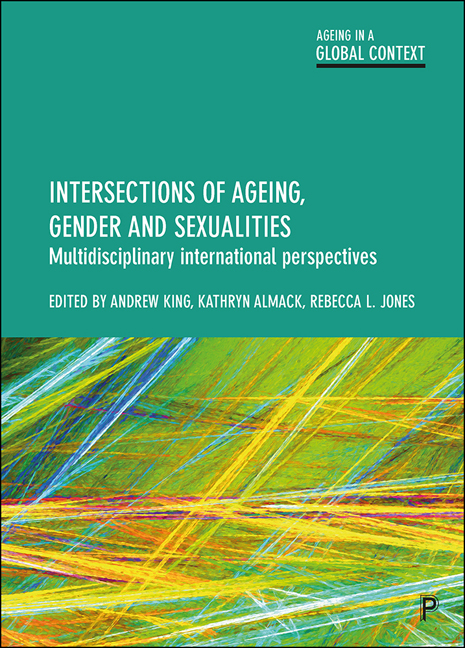one - Introduction: intersections of ageing, gender and sexualities
Published online by Cambridge University Press: 27 April 2022
Summary
Introduction
This book aims to encourage thinking about ageing as it relates to (at least) two other key aspects of people's lives: their gender and their sexuality, or more precisely how ageing, gender and sexuality co-construct one another. This first chapter explains how this book emerged and developed, its key themes and structure. In so doing, the chapter will discuss intersectionality, multi-disciplinarity and why, as editors, we think this is a timely and important collection.
There have been suggestions that ageing societies will entrench social divisions and inequalities, thereby exacerbating social tensions, while others see ageing societies as having considerable potential to promote and increase social inclusion and integration. Considerable research has been conducted on the interrelationship of ageing and gender (Arber and Ginn, 1991; Calasanti and Slevin, 2001; Cook-Daniels, 2006), as well as gender and sexuality (Jackson, 2006; Taylor et al., 2010) and, more recently ageing and sexualities (Cronin and King, 2010; Almack et al., 2010; Jones, 2011). However, there has so far been little interrogation of the interconnections of ageing, gender and sexualities, or more precisely their intersectionality. There is a need to fully address the complexity of intersections among and between these forms of social division, identity, (in)equality, power and privilege, and how they produce uneven outcomes in later life for different people and in different contexts. This also necessitates exploring how the intersections of ageing, gender and sexualities are informed by intersections with other social divisions, such as, but not limited to, race, culture, ethnicity, dis/ability, social class and geographical location.
Taking intersectionality and multi-disciplinarity seriously
Since its inception in black feminist scholarship in the late 1980s, intersectionality has been influential across, and been explored beyond, disciplinary boundaries. It has been described as a ‘threshold concept’ (Launius and Hassel, 2015), since it helps us to understand interlocking forms of oppression and privilege and how these are manifested at both structural and everyday levels. At its simplest, intersectionality points to how categories of identity and social division co-construct one another, such that an understanding of one is incomplete without a thorough assessment of how it is lived in relation to others: for instance, how an understanding of gendered and racial oppressions and discriminations are incomplete without an analysis of both (Crenshaw, 1993; Hill-Collins, 2000).
- Type
- Chapter
- Information
- Intersections of Ageing, Gender and SexualitiesMultidisciplinary International Perspectives, pp. 1 - 8Publisher: Bristol University PressPrint publication year: 2019



